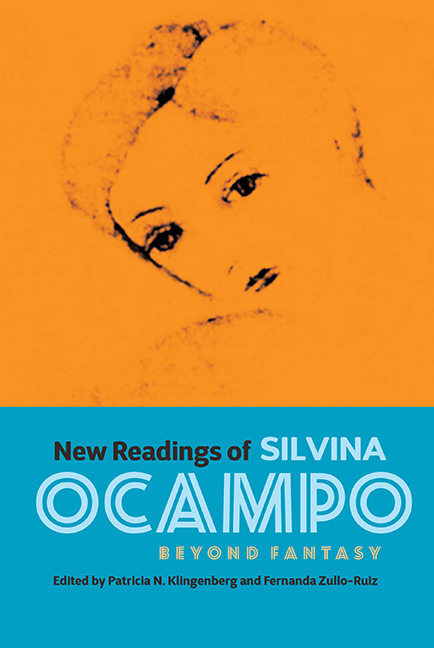Book contents
- Frontmatter
- Contents
- Illustrations
- Contributors
- Acknowledgments
- Introduction: Reading Silvina Ocampo
- 1 Silvina Ocampo for the Twenty-first Century: A Review of Recent Criticism
- 2 Re-reading Autobiografía de Irene: Writing and its Double in the Narrative of Silvina Ocampo
- 3 Sur in the 1960s: Toward a New Critical Sensibility
- 4 Reading Cruelty in Silvina Ocampo's Short Fiction: Theme, Style, and Narrative Resistance
- 5 Eros and its Archetypes in Silvina Ocampo's Later Stories
- 6 In Memory of Silvina Ocampo
- 7 Classical Reference in Silvina Ocampo's Poetry
- 8 Silvina Ocampo and Translation
- 9 The Gender-Bending Mother of “Santa Teodora”
- 10 Illicit Domains: Homage to Silvina Ocampo in Alejandra Pizarnik's Works
- Afterword: Reflections on Silvina Ocampo
- Bibliography
- Index
7 - Classical Reference in Silvina Ocampo's Poetry
Published online by Cambridge University Press: 31 March 2017
- Frontmatter
- Contents
- Illustrations
- Contributors
- Acknowledgments
- Introduction: Reading Silvina Ocampo
- 1 Silvina Ocampo for the Twenty-first Century: A Review of Recent Criticism
- 2 Re-reading Autobiografía de Irene: Writing and its Double in the Narrative of Silvina Ocampo
- 3 Sur in the 1960s: Toward a New Critical Sensibility
- 4 Reading Cruelty in Silvina Ocampo's Short Fiction: Theme, Style, and Narrative Resistance
- 5 Eros and its Archetypes in Silvina Ocampo's Later Stories
- 6 In Memory of Silvina Ocampo
- 7 Classical Reference in Silvina Ocampo's Poetry
- 8 Silvina Ocampo and Translation
- 9 The Gender-Bending Mother of “Santa Teodora”
- 10 Illicit Domains: Homage to Silvina Ocampo in Alejandra Pizarnik's Works
- Afterword: Reflections on Silvina Ocampo
- Bibliography
- Index
Summary
Silvina Ocampo's work abounds in classical references. Many of her best-known stories are peopled by curious cursi or mundane modern incarnations of furies, fates, seers, and sibyls, as well as by quirky characters bearing weighty names such as Ulysses, Isis, Athropos, Rhadamanthos, The Three Fates, and The Three Furies. Her peculiar genius is to be found in the ways in which, as Noemí Ulla has observed, Ocampo makes the meanings of this classical mythology resonate with her own network of myths, and also in her ability to integrate the world of Greek and Latin culture and mythology into the everyday (Invenciones 80–81, 182). Ocampo's poems, even more so than her short stories, make repeated reference to classical mythical figures, yet this important dimension of her work has not yet been fully explored by critics. I therefore propose to present an overview of classical references in Ocampo's poetry, examining the various ways in which she draws upon classical mythology. I shall argue that Ocampo obliges the reader to consider her chosen classical references in a new light, whether by virtue of geopolitical repositioning or metapoetic reflections. I will then focus in the final pages of the chapter on the mythical character to whom she affords the most extended treatment, namely Narcissus.
Context: Ocampo's Acquaintance with the Classics
Ocampo was home-schooled with French and English governesses, and – as far as I can ascertain – for her, as for many of her contemporaries, much of her acquaintance with classical references was, at least initially, mediated through other literature (Campuzano 325). It is therefore to Ocampo's extensive reading of English, French, and Spanish poetry that we must turn first in order to appreciate an important dimension of her acquaintance with the classical world. First, we can see a rich mine of classical allusions and references in those anglophone poets that Ocampo translated for publication in her sister Victoria's influential cultural journal Sur, and those she translated and published alongside her own poetry in Lo amargo por dulce (1962). These poets include Shakespeare, Donne, Pope, Wordsworth, Byron, Keats, Walter de la Mare, David Gascoyne, Kathleen Raine, Graham Greene, Stephen Spender, Vita Sackville-West, Edith Sitwell, and Edwin Muir.
- Type
- Chapter
- Information
- New Readings of Silvina OcampoBeyond Fantasy, pp. 143 - 172Publisher: Boydell & BrewerPrint publication year: 2016



